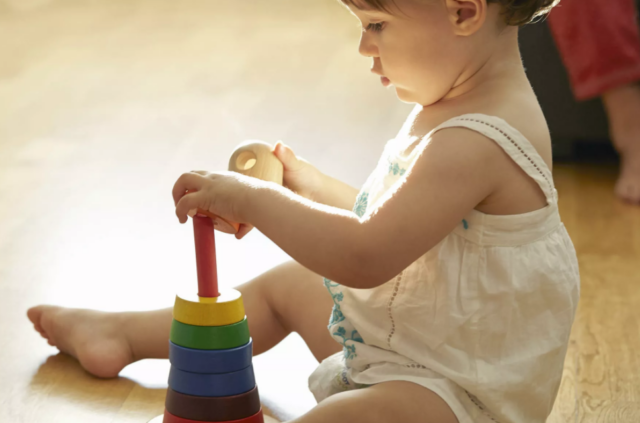RIE parenting is a philosophy that emphasizes the importance of teaching children through play. This philosophy has led to the development of a number of toys and games designed to help parents teach their kids about the world around them.
The rie parenting books are a series of books that focus on the basics of raising children. They provide parents with insight into their child’s behaviors and how to react in different situations.
Is RIE the newest parenting craze or does it really work? Loved by Hollywood celebs, is it the latest parenting fad or does it actually work?
The idea of RIE parenting has a poor rep among non-believers, who view its principles as too liberal and lacking in the kinds of routines and limits that young children need to feel safe. Opponents claim that RIE parents are offering tiny infants options, imbuing them with independence and a degree of cognitive awareness that does not present in such young children.
We don’t follow or encourage any parenting style at 100 Toys since we think that each parent understands their kid best. We do, however, prefer to remain educated and investigate as many diverse points of view as possible. Even for the most adamant traditionalist, we believe there is enough of knowledge to be gained through RIE parenting, even if you don’t sign up for the whole package.
Here’s a quick rundown of RIE parenting:

- Resources for Infant Educarers (RIE) is an acronym for Resources for Infant Educarers. Magda Gerber, an infant-development specialist who believed in giving infants greater freedom and respect, created it in Los Angeles in 1973.
- RIE parenting encourages us to be more aware of our children, to see them as distinct individuals with their own wants and ideas, rather than as “blobs” to be molded by adults or as “screens” onto which we project our own views. Parents should keep an eye on and listen to their children, allowing them to express their needs. Instead of presuming a crying infant is hungry or exhausted, we should pause to consider what else could be troubling them. We should make an effort to learn their dialect.
- Parents of RIE children should examine their own habits: do we immediately bounce them up and down, switch on the TV, or offer them a toy when they complain? Are we generating new demands and dependencies where none previously existed? RIE thinks that through analyzing our own behavior, we may discover the solutions to their questions.
- Bouncers, sippy cups, pacifiers, and pretty much everything else that encourages your baby to zone out is discouraged, since they are intended to mask their real feelings (Gerber even referred to prams and buggies as “mobile prisons”). According to the idea, silencing infants leads to depressed children and adults.
- RIE parents value their children’s intelligence and believe they have strong emotions and sensitivities. They speak to their children in a mature tone. They inquire as to what they would want to do. and speak to their kids about what’s going on in the present without dumbing it down: ‘I’m leaving the room to fetch you a drink since you said you were thirsty.’
- Time-out or any other kind of humiliation is never used as a form of punishment by RIE parents. They don’t even attempt to divert a tantruming child’s attention. They freely embrace and recognize the validity of all of the child’s feelings.
- They also don’t over-praise, thinking that children should develop inner-directedness so that they may play and select activities based on their own needs rather than transferring our interests onto them. As a result, the kid is able to control their own play and is confident in their decisions.
- RIE parents let their children play for as long as they seem to want to, surrounding them with open-ended toys like boxes, balls, and blocks that encourage inquiry and exploration rather than imposing ideas.
- RIE parents don’t interfere in their children’s conflicts because they believe it is preferable for them to solve problems on their own. Non-RIE parents may find this difficult to accept at first, but the goal is to raise a kid who can manage and resolve conflict in the long term.

Going full RIE, with few tools to divert a wailing infant or calm a toddler’s tantrum, is a tough commitment for a parent to undertake, particularly for those of us who work from home or have busy families with many children to consider at any one time. It may also make play dates and time spent with non-RIE families difficult, since they may see a lack of parental involvement as misguided at best.
For most of us, adhering to a set of guidelines that requires us to be fully aware of our baby’s needs at all times is just not feasible. But if you enjoy the concept of RIE parenting and believe, as we do, that it is founded on some sound ideas, there’s no reason why you can’t integrate the RIE spirit into your own parenting approach. After all, the concept behind it is that everyone would be happier and more secure if we pay attention to and respect our children. And it is undoubtedly a goal that we can all support.
The RIE parenting vs montessori is a blog post on the differences between RIE and Montessori.
Frequently Asked Questions
What is the RIE parenting method?
The RIE (Responsible, Inclusive, and Empowering) parenting method is an approach to parenting that encourages parents to be proactive in their childs life.
What are the RIE principles?
The RIE principles are a set of guidelines for the design and construction of residential buildings. They were developed by the Royal Institute of British Architects in response to new building regulations introduced in England after World War II.
What is the difference between RIE and Montessori?
RIE is a curriculum that was created by Maria Montessori. It is an educational philosophy that encourages children to learn through experience and discovery.




